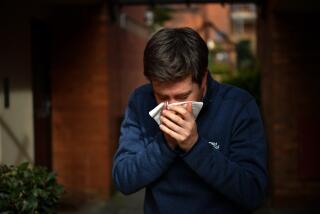Health : Why We Work Sick : Workers Who Drag a Cold to the Office May Just Be Lonesome--or Exercising a Bit of Healthy Denial
- Share via
Actress Sherri Stoner spent intermission backstage at the Groundlings Theatre this weekend doing more than painting her lips flame red for her next scene.
She also was gulping down medication, as she has for the last three weeks, to quell her aches, chills and a 101-degree fever so her show could go on. Her persistence was as much for artistic as economic reasons.
“They need me,” she said, explaining why she worked while ill. “There are only two other girls in the cast.”
Can’t Miss a Day
In the midst of the cold and flu season, countless other ailing Los Angeles residents are sniffling and struggling through work, dragging themselves in by their fingernails to finish projects on deadline or to attend important meetings impossible to reschedule.
They work sick, despite objections from their concerned families and the advice of public health officials who claim that bed-rest is best, especially in the initial stages of flu and colds.
“You’re most infectious in the first 48 hours after the onset of cold or flu symptoms,” said Dr. George Gellert, medical epidemiologist with the Los Angeles County Department of Health Services. “The ability to infect another person starts to drop off after 48 hours.”
So why do so many of us keep laboring with those runny noses and raging fevers?
Many workers often have no choice because of concerns about money or a home situation.
But some personality types do feel compelled to shun rest and chicken soup when ill, while others actually experience some unexpected psychological fringe benefits from working sick, mental health experts say.
Moreover, downplaying or even denying cold or flu symptoms can actually make us physically stronger in the long run, some experts say.
Who is most likely to work while sick? Not surprisingly, it’s the enthusiastic workers. “People who really love their job are more apt to work through sickness,” said Albert R. Marston, a USC psychology and psychiatry professor.
Those whose lives revolve mostly around their work also are less likely to give up when stomach cramps and sniffles strike.
“The job is their identity,” said Marc Schoen, a Woodland Hills psychologist on staff at Cedars-Sinai Medical Center. “To not work means almost being without an identity, which has predictable roles and duties. Take it away and there’s puzzlement about how to act. (They ask,) ‘How do I stay home and relax?’ ”
Individuals who have trouble handling idle time also are likely to work while sick. Patrick Joyce, a Glendale real estate agent who recently worked through a bad cold, observed: “I’m just not the kind of person who can sit at home.”
Team players are more likely than prima donnas to show up with tissues and medications in hand, experts say, because they’re concerned about letting down co-workers or clients if they don’t show for work.
‘Sack of Medications’
Take the case of Lisa Bradberry, a supervisor at a Los Angeles coffee service company. She packed a “lunch sack full of medications” during her recent bout with the flu and commuted the 55 miles from her home in Acton. “We’re short one person,” she said. “If I didn’t service the accounts, it wouldn’t have gotten done.”
For some people, being sick--and working through an illness--is considered an inevitable part of life, especially if they’ve grown up believing that life isn’t always roses, Schoen said, noting: “When they get a cold or the flu, they say, ‘Yeah, I do feel miserable, but life is supposed to be tough.’ Therefore, when life is difficult, that creates a sense of self-value.”
For others, the negative aspects of staying home while ill outweigh the headaches of work. “It’s very lonely for some people to stay home sick,” particularly if they live alone, Marston said.
Schoen agreed, saying: “Going to work sick may get some workers more sympathy than staying home.”
Of course, the experts note that some workers simply like to play the role of martyr, countering co-workers’ sympathy and appeals for them to leave work with the standard reply, “Oh, no, I’ll be fine.”
Some sick workers do slow down after others nag them. Bradberry finally saw a doctor after her husband, Randy West, insisted. Joyce, the real estate agent, closed a Sunday open house early after a former client came by and told him he looked awful.
‘Nothing Heroic’
But nagging doesn’t always work. John Weir, a Los Angeles public relations executive, worked on Friday over the objections of his wife, Paulette. She reminded him that he “wasn’t a kid anymore.”
Still, he countered through sniffles: “A new business proposal has to be ready Monday. Ironically, it’s for a hospital chain.”
Weir’s argument holds no weight with Gellert, the epidemiologist. “There’s nothing heroic in going to work when you’re ill,” he said. “You probably do inferior quality work and may infect other people. We urge employers to take the long view of illnesses such as colds and flu, and to encourage employees to lose one or two days over the course of a year rather than have them coming to work and causing widespread infection, which results in greater loss of employee work time and productivity.”
Still, some workers swear the best way to combat most common colds and flu is to downplay or even deny their symptoms, to look at the illness as a temporary deficiency to be overcome.
Admitting Defeat
“A lot of us are health-conscious and being sick is kind of an indication you haven’t been doing your health job--taking your vitamins, say, or exercising,” Marston said. “Going back to work is a mind-over-body notion.”
Some people, Marston said, even believe that going back to work will actually speed their recovery.
That view may not be totally preposterous, Schoen said: “Denial can be bad if an illness is serious. But maybe there’s such a thing as healthy denial.”
The best approach, Schoen suggested, may be to acknowledge an illness but not be obsessive about its symptoms; cold sufferers may pack a big box of tissues but not talk endlessly about how lousy they feel.
“Some studies suggest that people who infrequently get sick say, ‘I don’t have time for this,’ ” Schoen noted. “When they feel initial symptoms, they begin to say, ‘I’m not going to let this slow me down.’ ”
Richard A. Dienstbier, a psychology professor at the University of Nebraska-Lincoln who has studied physiological toughness, observed: “People who feel psychologically distressed by colds and flu are likely to produce more cortisol, a hormone that can suppress the immune system. Therefore, they are likely to have more of a bacterial or viral invasion,” he says, though not all experts agree.
There’s no conclusive proof that healthy denial works, Schoen said, but he added that “lots of anecdotal reports” suggest it probably can’t hurt.
More to Read
The biggest entertainment stories
Get our big stories about Hollywood, film, television, music, arts, culture and more right in your inbox as soon as they publish.
You may occasionally receive promotional content from the Los Angeles Times.










